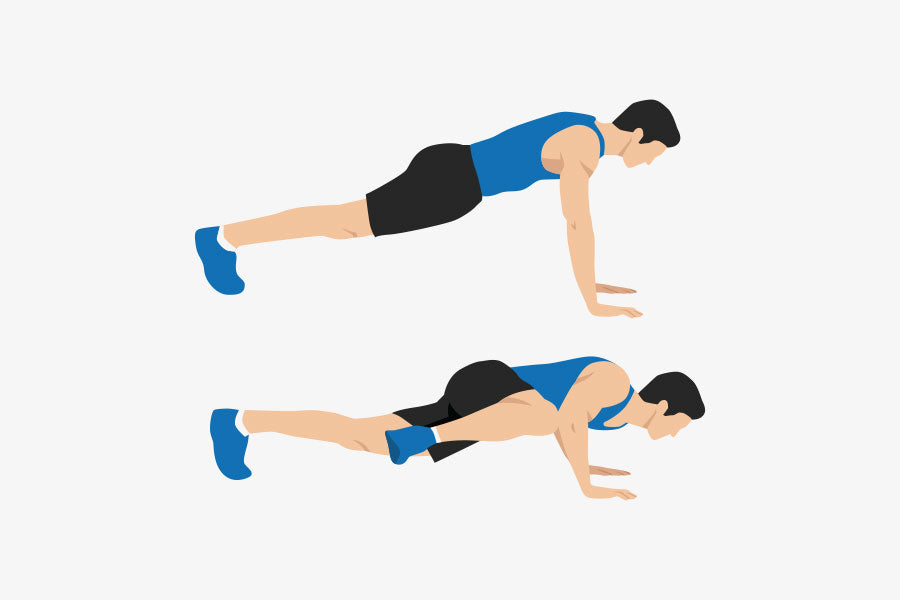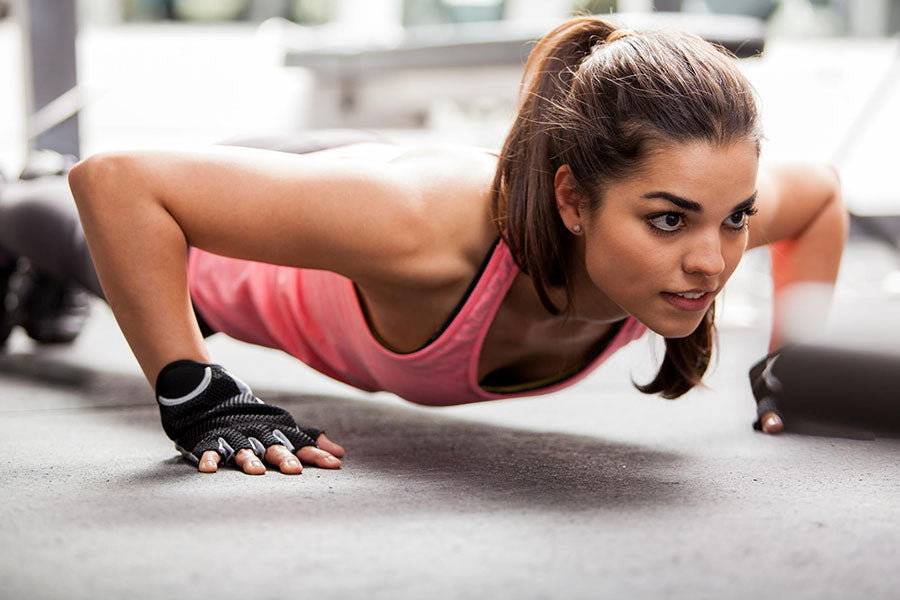Push-ups are a fantastic way to work your upper body and core. They're also relatively simple to do, can be done anywhere, and don't require any equipment.
Most people think of push-ups as an upper-body exercise. And it's true. They are great for working the chest, shoulders, and triceps. But did you know that push-ups can help build full-body strength?
Push-ups work the stabilizer muscles in your core, which helps improve your balance and stability. They also work the muscles in your legs and glutes, making you stronger overall.
So push-ups are a great choice if you're looking for a workout to help you build strength in your upper and full body!
How to Do a Basic Push-Up

Once you've mastered the basic push-up, you can move on to more challenging variations.
- Start in a plank position with your hands placed shoulder-width apart and your feet hip-width apart.
- Lower your body toward the ground, keeping your core engaged and your back straight.
- Push back up to the starting position when your chest touches the ground.
- Repeat this movement for 10-12 reps.
Top 8 Benefits of Push-Ups
We all know that push-ups are a great way to work your chest and arms, but did you know that they offer a variety of other benefits as well? Here are eight reasons to add push-ups to your regular fitness routine.
1. Work Multiple Muscles Simultaneously
There's a reason the push-up is considered one of the most basic yet effective exercises out there - it works multiple muscles simultaneously. The chest and triceps are primarily engaged when doing a push-up, but your shoulders, core, and legs also have to work to stabilize your body.
As a result, you get a full-body workout with just this one exercise. Plus, since you're using your own body weight as resistance, you can do push-ups anywhere, anytime - no equipment necessary.
So next time you're looking for a quick and easy way to work for multiple muscle groups at once, consider adding some push-ups to your routine. You might be surprised at just how much of a workout you can get from this simple exercise.
2. Improve Upper Body Strength
The push-up is one of the exercises for developing upper body strength. By using your own body weight as resistance, the push-up targets your chest, shoulders, arms, and core muscles.
While it may seem like a simple movement, the push-up requires great stability and control. As you lower yourself toward the ground, your muscles work hard to keep your body in alignment.
This not only strengthens the muscles themselves but also improves your overall posture and balance. In addition, push-ups are an excellent way to develop functional strength.
Unlike weightlifting exercises that isolate specific muscles, push-ups train your body to work as a unit. As a result, it can help improve your performance in activities that require upper body strength, such as swimming, climbing, and pressing movements.
Whether a beginner or a seasoned athlete, incorporating push-ups into your workout routine can help you achieve your fitness goals.
3. They are Easy to Adapt
One of the great things about push-ups is that they are so easy to adapt. Whether you're just starting out or a seasoned athlete, there's a way to make them work for you.
For beginners, wall, and knee push-ups are a great option. As you get stronger, you can try doing full push-ups with your feet on the ground.
There are also variations like wide-grip or close-grip push-ups that target different muscles. So whatever your fitness level, there's a way to make push-ups work for you.
4. Work Your Legs
Most people think of push-ups as an upper-body exercise, but did you know they also work your legs? That's right - the benefits of push-ups extend beyond just your arms and chest. According to a Harvard publication, your legs must work hard to keep your body stable when you do a push-up.
As a result, you get a great leg workout while working your upper body. And contrary to popular belief, push-ups can also impact gluteal development. When done correctly, push-ups activate the quads, hamstrings, and glutes.
So next time you're looking for a full-body workout, don't forget the humble push-up!
5. Contribute to Core Stability
Did you know that push-ups contribute to core stability? For starters, push-ups help improve posture and alignment. According to a study, they strengthen the muscles in the chest, shoulders, and arms, as well as stabilize muscles in the core.
In addition, push-ups can help reduce back pain by strengthening the muscles that support the spine. So next time you're looking for a way to improve your strength and stability, consider adding some push-ups to your routine. You just might be surprised by the results.
Related Article: Five Moves to Tone Your Abs and Build Core Strength
6. Enhance Posture and Balance
Push-ups work all the major muscles in your upper body, and when these muscles are toned and strong, they help support your spine and keep your posture upright.
In addition, balancing your body on your hands and toes strengthens the muscles in your legs and core, which can help improve your overall sense of balance.
While you can certainly get these benefits from other exercises, push-ups are a convenient way to simultaneously work on posture and balance.
7. Measure Upper Body Strength and Endurance
There's a reason the push-up is such a popular exercise - it's a great way to measure upper body strength and endurance. Unlike other exercises that focus on one specific muscle group, push-ups work multiple muscles in the arms, chest, shoulders, and back. As a result, they provide a comprehensive workout for the upper body. And because they can be performed anywhere, at any time, they're an easy and convenient way to stay in shape.
But the benefits of push-ups don't stop there. In addition to strengthening the muscles, push-ups also help improve bone density. They're also a great way to improve cardiovascular health and develop better posture. So if you're looking for an exercise that does it all, look no further than the trusty push-up.
8. Is Budget-Friendly
You could join a gym and spend hundreds of dollars annually on membership. Or you could go out and buy a bunch of fancy workout equipment. But if you're looking for a budget-friendly way to get in shape, you can't go wrong with push-ups.
Not only are they free to do, but they also offer various benefits. For starters, they're great for building upper body strength. They also help improve your posture and can even help to reduce back pain.
Plus, they can be done anywhere, so you don't need to invest in a gym membership or expensive equipment. So if you're looking for a cost-effective way to get fit, add some push-ups to your routine.
Related Article: Bodyweight Workouts: 16 Best Bodyweight Exercises for Beginners
Variations of Push-Ups
There are many variations of push-ups, so you can find one that best suits your fitness level. You can start with simple push-up variations and gradually move from the basic push-up to more challenging ones.
Wall Push-Ups

If you're new to push-ups, start with the wall push-up. This variation is the easiest to perform and is a great way to get your form down before moving on to more difficult variations.
To do a wall push-up, stand about an arm's length away from a wall and place your palms flat against the wall at shoulder height. Lean into the wall and bend your elbows until they're at a 90-degree angle. Then, push yourself back to the starting position.
Knee Push-Ups

As you become more comfortable with wall push-ups, you can move on to knee push-ups. This variation is performed the same way as a wall push-up, except that your knees are on the ground instead of your feet.
Start in a plank position with your palms flat on the ground and your knees bent. Then, bend your elbows and lower your body until your chest nearly touches the ground. Push yourself back up to the starting position.
Full Push-Up

If you're looking for a challenge, try doing full push-ups. These are the standard push-ups.
Start in a plank position with your palms flat on the ground and your feet shoulder-width apart. Bend your elbows and lower your body until your chest touches the ground. Then, push yourself back up to the starting position.
You can also use a resistance band for a band push-up, or you may use a stepper for an alleviated push-up making it more challenging.
Pike Push Up

Start in a high plank position with your hands shoulder-width apart and your feet hip-width apart. Bring your hips up so that your body forms an upside-down V shape. Lower your head toward the ground, keeping your core engaged and your body in a straight line from head to toe. Press back up to the starting position.
One-Arm Push-Up

Start in a high plank position with one hand on the ground and the other on your hip. Lower your chest toward the ground, keeping your core engaged and your body in a straight line from head to toe. Press back up to the starting position. Repeat on the other side.
Spiderman Push-Up

Start in a high plank position with your hands shoulder-width apart and your feet hip-width apart. As you lower your chest toward the ground, bring one knee up to touch your elbow. Press back up to the starting position. Repeat on the other side.
No matter what level you're at, spiderman push-ups are a great way to work your upper body and core. So get out there and start doing some push-ups today.
FAQs
1. How often should I do push-ups for optimal results?
The frequency and intensity of your push-ups will depend on several factors, such as your age, current fitness level, and goals. However, most experts recommend performing at least a few sets of push-ups each day for maximum benefits.
2. Can I do other strength exercises besides pushing myself up with my arms?
Yes, you can combine different strength exercises with push-ups to give you an even more intense workout. Examples include squats, lunges, planks, crunches, tricep dips on a bench or chair, and calf raises. You might also consider adding weight training or free weights to your routine for added resistance.
3. Are there any safety tips I should remember when doing daily push-ups?
Firstly, starting slowly when incorporating regular push-up workouts into your routine is important to avoid injury or overexertion.
You may also want to consider working with a personal trainer or physical therapist to ensure proper form and technique as you start this exercise regimen.
Additionally, be sure to allow yourself adequate rest and recovery time between sessions so that your muscles have time to rebuild themselves stronger than before.
4. How can I get motivated to keep doing push-ups every day, even when I'm feeling tired or unmotivated?
You can use many strategies to stay motivated when it comes to sticking to a daily push-up routine. Some ideas include setting specific goals for yourself (such as a certain number of reps per set or number of sets per workout), tracking your progress over time using a fitness journal or app on your phone or tablet device, enlisting the support of friends or family members who can encourage you along the way, and incorporating healthy rewards into your schedule whenever you meet certain milestones (like getting through an especially tough week).
The Bottom Line
And there you have it — several reasons why push-ups are a great exercise for your upper body, lower body, and core. They're easy to do almost anywhere, don't require equipment, and can be modified to fit any fitness level. So what are you waiting for? Get down on the floor and try out a few push-ups today! Your muscles (and your wallet) will thank you.
Reading List
Quick & Effective Bodyweight Workout for Women
9-Weeks Bodyweight Workout Plan for Strong Muscles
20 Highly Effective Ring Workouts for Bodyweight Strength and Conditioning
Bodyweight Workouts: 16 Best Bodyweight Exercises for Beginners
Article Sources
- Calatayud, Joaquin, et al. "Muscle Activation during Push-Ups with Different Suspension Training Systems." Journal of Sports Science & Medicine, vol. 13, no. 3, Sept. 2014, pp. 502–10. PubMed Central, https://www.ncbi.nlm.nih.gov/pmc/articles/PMC4126284/.
- Chulvi‐Medrano, Iván, et al. "COMPARISON OF THE EFFECTS OF AN EIGHT‐WEEK PUSH‐UP PROGRAM USING STABLE VERSUS UNSTABLE SURFACES." International Journal of Sports Physical Therapy, vol. 7, no. 6, Dec. 2012, pp. 586–94. PubMed Central, https://www.ncbi.nlm.nih.gov/pmc/articles/PMC3537455/.
- Solan, Matthew. "The Rise of Push-Ups: A Classic Exercise That Can Help You Get Stronger." Harvard Health, 18 Feb. 2019, https://www.health.harvard.edu/blog/rise-push-ups-classic-exercise-can-motivate-get-stronger-2019021810165.
- van den Tillaar, Roland, and Nick Ball. "Push-Ups Are Able to Predict the Bench Press 1-RM and Constitute an Alternative for Measuring Maximum Upper Body Strength Based on Load-Velocity Relationships." Journal of Human Kinetics, vol. 73, July 2020, pp. 7–18. PubMed, https://doi.org/10.2478/hukin-2019-0133.











